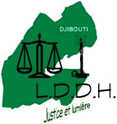01/05/09 (B497) LDDH : DIFFUSION D’INFORMATION DU 1er MAI 2009. Zimbabwe : Donors Should Focus First on Reforms.
 Le Président |
DIFFUSION D’INFORMATION DU 1er MAI 2009. |
En ce jour du 1er Mai 2009, notre pensée est avec les Travailleurs du Monde entier.
En ce jour mémorable, il n’est pas possible de parler de Développement à Djibouti sans que les Travailleurs/Travailleuses Djiboutiens (nes) aient le plein droit à manifester, le plein droit à déclencher des grèves, à avoir droit à la totale Liberté d’Expression.
La Ligue Djiboutienne des Droits Humains (LDDH) témoigne sa solidarité aux propositions de Human Rights Watch sur les nécessités prioritaires pour toute assistance au Zimbabwe.
NOEL ABDI Jean-Paul
_________________________________________________
Human Rights Watch
Zimbabwe: Donors Should Focus First on Reforms
Critical Changes Needed Before Resuming Development Assistance
April 29, 2009
(London) – International donors should not resume development aid to Zimbabwe until the ZANU-PF element in the power-sharing government ends its ongoing rights abuses and backs serious reforms, Human Rights Watch said today. This week, the new government’s finance minister, Tendai Biti, is in the United Kingdom to ask the British government for direct financial support.
« Humanitarian aid that focuses on the needs of Zimbabwe’s most vulnerable should continue, » said Georgette Gagnon, Africa director at Human Rights Watch. « But donor governments such as the UK should not release development aid until there are irreversible changes on human rights, the rule of law, and accountability. »
Police intimidation and arrests of activists are ongoing, and supporters of the Zimbabwe African National Union-Patriotic Front (ZANU-PF) – the longtime ruling party and member of the new power-sharing government – continue to violently invade commercial farms. The government also includes two formations of the Movement for Democratic Change (MDC). All three have made clear commitments to end abuses, but pro-ZANU-PF police and prosecuting authorities continue to conduct politically motivated prosecutions of political opponents and have failed to investigate allegations of torture.
For example, on April 21, 2009, police violently broke up a peaceful protest at Masvingo State University and arrested at least 23 students. The students spent three days in custody. Most were released without charge. One student, Courage Ngwarai, remains in custody facing charges allegedly arising from a demonstration organized in 2007.
On April 20, police re-arrested two MDC activists, Ghandi Mudzingwa and Kisimusi Dhlamini, though a High Court judge had granted them bail. The two activists were abducted by state agents in November and December 2008 and allege that they were repeatedly tortured. Police are also reported to be looking for a freelance journalist, Anderson Shadreck Manyere, who was also granted bail by the High Court on similar charges. Seven other MDC and human rights activists abducted after the three parties signed the Global Political Agreement on September 15, 2008, are still missing and their whereabouts remain unknown.
The « disappeared » are: Gwenzi Kahiya, Ephraim Mabeka, Lovemore Machokoto, Charles Muzza, Edmore Vangirayi, Graham Matehwa, and Peter Munyanyi.
Since January, ZANU-PF supporters and militia have violently invaded commercial farms and harassed commercial farmers, resulting in the displacement of hundreds of farm workers. On April 21, police shot and wounded two farm workers from Stockdale Farm in Chegutu, about 100 kilometers west of Harare.
The state authorities continue to do nothing concrete to prevent these attacks or to offer meaningful redress to the victims.
The power-sharing government has also made no attempt to repeal or substantially amend repressive laws such as the Public Order and Security Act (POSA) and the Access to Information and Protection of Privacy Act (AIPPA), which have in the past been used by ZANU-PF to harass political opponents and human rights activists. Media restrictions, such as tightly controlled access to the country for foreign media, remain in place.
« Until the new government takes bold, irreversible steps to end human rights abuses and carry out major legislative reforms, the international community should continue to withhold longer-term development aid and maintain its targeted sanctions, » Gagnon said.
In the short term, Human Rights Watch called on the power-sharing government to:
Disclose the whereabouts of the seven « disappeared » persons;
End harassment of civil society activists, student leaders, and MDC activists; and free those who have been illegally abducted;
Investigate allegations of torture and hold fully to account those found to be responsible, whatever their positions or ranks;
Halt farm invasions, remove immediately those who have invaded properties since the Global Political Agreement was signed, and respect private property rights;
Carry out without delay human rights reforms to the police, judiciary, prosecuting authorities, intelligence services, armed forces, and other state bodies that continue to abuse the rights of Zimbabweans. The focus should be on restoring full media freedoms and rights of individuals to free expression, movement, and association.
http://www.hrw.org/en/news/2009/04/29/zimbabwe-donors-should-focus-first-reforms
